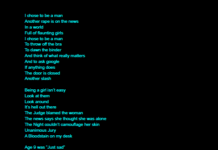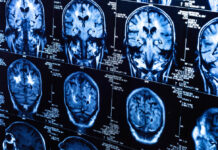SSRIs, Lindsay Clancy, and Me
Sharing the similarities between Lindsay Clancy's homicidal episode and my own will hopefully help prevent rare SSRI-induced suicides and homicides, including mass shootings.
Campaign Against ECT Gains Traction in UK
"Across the pond," campaigners’ efforts against electroshock are gaining public notice. Can their approach work in the US?
A New York City Psychiatric Hospital Patient Said Staffers Illegally Restrained and Drugged Her;...
“No one is watching these hospitals,” Miranda warned. “No one is listening. Our rights are being violated left and right. They can do whatever they want.”
Screening for Perinatal Depression: An Effective Intervention, or One That Does More Harm Than Good?
Why does the U.S. describe perinatal screening as providing a proven benefit, while the task forces in the U.K. and Canada see no evidence of such benefit?
Beyond Labels and Meds—Closer Look: Isabella Castillo
At times I tend to feel invisible. Sometimes I don’t feel like I fit in with everyone else; I feel like an outsider.
Beyond Labels and Meds—Closer Look: Madeline Aliah
Meet another talented teen behind the pieces in MIA's art exhibition. She writes: "This poem was written in my first year at a queer-positive school and is processing the new forms of guilt and shame I experienced and was exposed to."
A New Paradigm for Testing Psychiatric Drugs Is Needed
This paper reviews the problems with the usual double-blind, placebo-controlled trials on which drug approvals are based, and advocates for a stricter form of testing psychiatric drugs with patient-relevant outcomes, real comparators, long-term outcomes, and assessment of harms.
Beyond Labels and Meds—Closer Look: Aurora Ramos
Meet another talented teen behind the pieces in MIA's art exhibition, who says: "I think art is underrated sometimes because of its seemingly uselessness, but I highly believe it can cure many minds."
Beyond Labels and Meds—Closer Look: HoJin Kwak
This is the first of 4 spotlight interviews with some of the talented youth behind the pieces in MIA's art exhibition. HoJin states: "The original idea for my drawing started with the brain. The complexity of its sudden twists and curves fascinates me."
Teen Arts Exhibition: Beyond Labels And Meds: What It Feels Like To Be Me
28 teen artists share the power of their creativity in this collection of profoundly moving, courageous, and beautiful artwork.
“You Can’t Coerce Someone into Wanting to Be Alive”: The Carceral Heart of the...
“You can’t coerce someone into wanting to be alive. Force just doesn’t work. People must be invited to live while supporters (healthcare professionals, social workers, loved ones) make their lives and world more habitable.”
Why Isn’t There a Popular Hashtag for Involuntary Commitment?
As uses of psychiatric force expand, can social media be better used to focus critical attention?
And Now They Are Coming for the Unhoused: The Long Push to Expand Involuntary...
Mayor Adams' plan to "involuntarily remove" unhoused people has met with backlash from activists and the unhoused, who say it violates their rights and further entrenches systemic racism.
The Nurtured Heart Approach Goes Mainstream: Research and Experience Support “Celebrating Greatness in Every...
The Nurtured Heart Approach represents a massive shift in thinking—about schooling, about children and how to raise them, about how we regard those with intensity, and about the medical model pathologizing them.
The Serotonin Zombie: Authors of New Study Try to Breathe New Life into the...
Despite new claims that their study provides "clear evidence" linking serotonin and depression, their data actually supports the opposite conclusion: serotonin levels did not correlate with depression.
A Neuroscientist Evaluates the Standard Biological Model of Depression
Current evidence does not support a biological hypothesis of depression. It is far better predicted by levels of childhood trauma, life stress, and lack of social supports.
In Andrew’s Honor: Attorney Elizabeth Rich’s Fight Against Unjust Commitments
Anyone detained and then formally committed under Wisconsin’s civil mental health laws can initially be held and forcibly drugged for six long months. Yet, for years, not a single person has been able to appeal the six-month commitments in court.
“Holy Shit!” Psychiatry’s Cognitive Dissonance on Display
Even those who would seek to reform the profession of psychiatry cannot confront the reality that exists in the research literature
Psychiatry, Fraud, and the Case for a Class-Action Lawsuit
For decades, psychiatry committed medical fraud when it told the public that antidepressants fixed a chemical imbalance in the brain.
Suicide Hotlines and the Impact of Non-Consensual Interventions
Those struggling with suicidal thoughts may stay silent instead of reaching out to suicide hotlines because they fear non-consensual intervention and the harmful impact of police involvement.
Medicating Preschoolers for ADHD: How “Evidence-Based” Psychiatry Has Led to a Tragic End
The prescribing of stimulants to preschoolers diagnosed with ADHD is on the rise, which is said to be an "evidence-based" practice. A review of that "evidence base" reveals that claims that ADHD is characterized by genetic and brain abnormalities are belied by the data, and that the NIMH trial of methylphenidate in this age group told of long-term harm.
Roll-out of 988 Threatens Anonymity of Crisis Hotlines
Even after their own advisory committee criticized call tracing, leaders of the National Suicide Prevention Lifeline have been lobbying government for cutting-edge mass surveillance and tracking technology. Privacy experts are raising concerns.
Fireside Project: Peer Support for Psychedelic Experiences
A new nonprofit support line takes a harm-reduction approach and helps people process their psychedelic experiences.
Art, Music, Exercise, and More: What Are the Recommended Doses for Improving Mental Health?
Researchers have calculated the dose-response benefits of ordinary hobbies, habits, and lifestyle practices that are available without any trip to a doctor or a drug store.
Crisis on Campus: Mental Health Counselors Are Feeling the Crush
A dramatic rise in demand for college mental health services has led to counselors feeling burned out. Counseling center directors are looking for solutions.

































